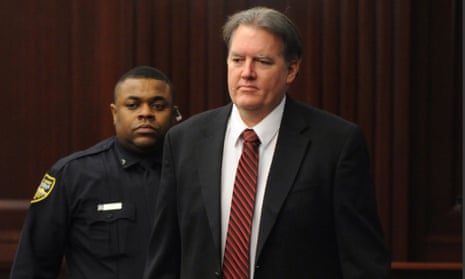A jury has declared that it could not reach a decision on whether a Florida man, who shot dead a teenager in a dispute over loud music, was guilty of murder or had acted in self defence.
The judge in Jacksonville declared a mistrial on the first-degree murder charge on Saturday, although the jury convicted Michael Dunn on three lesser counts of attempted second-degree murder, and shooting into an occupied vehicle. Dunn could face a sentence of between 20 and 60 years.
Dunn, 47, shot Jordan Davis, 17, during the altercation at a Jacksonville gas station in November 2012, sparked by the youth’s refusal to turn off music blaring from the vehicle he was in with a group of friends.
The case re-ignited the debate over Florida’s self-defence and gun control laws seven months after neighbourhood watch leader George Zimmerman was acquitted of murdering another unarmed black teenager, Trayvon Martin, in a fight at a Sanford housing estate.
The failure of the jury to convict Dunn on the principal murder charge was a blow for the prosecution team led by state attorney Angela Corey, which was heavily criticised for its failure to secure a conviction against Zimmerman.
The prosecution must decide whether to order a new trial on the first-degree murder charge.
Dunn said he feared for his life after seeing Davis point a shotgun at him and was then forced to fire when the teenager charged at him, swearing and threatening to kill him.
But although police never found a weapon, and a medical examiner said she believed the youth was lying on the back seat of the vehicle when he was shot, not outside it, the jury of seven women and five men, who deliberated for four days, could not agree whether Dunn was guilty of first-degree murder.
State attorney Erin Wolfson had outlined a scenario in which Dunn simply “lost it” because he was “disrespected by a mouthy teenager”, fired 10 shots into the SUV then fled to a nearby hotel with his
girlfriend where they ordered pizza and spent the night watching movies.
During his own testimony, Dunn said he was “crazy with grief” when he learned of Davis’s death and spent the night vomiting in his hotel bathroom.
Key evidence included a medical examiner testifying that Davis was probably lying on the back seat of the SUV when he was shot, not outside the vehicle and charging towards Dunn as the defendant claimed.
Prosecutors also rounded on several inconsistencies in Dunn’s testimony, particularly that his fiancée Rhonda Rouer told the court that he never told her he had seen Davis brandishing a gun. And they
pointed out that Dunn and Rouer drove two and a half hours to their home in Satellite Beach, Florida, the morning after the shooting without calling the police, even though he knew by then that Davis was dead.
Dunn’s lawyer, Cory Strolla, said during closing arguments that his client had no duty to retreat under Florida’s Stand Your Ground laws and instead had every right to use deadly force to defend himself.
The confrontation took place on the evening of 23 November 2012, at a Gate gas station in Jacksonville when Dunn and Rouer, who had attended the nearby wedding of his son, were on their way back to their hotel three miles away and decided to stop for wine and snacks.
Dunn pulled his car into a space to the right of the teenagers’ red Dodge Durango, and according to Rouer’s testimony, complained that he “hated that thug music” when they heard the loud thumping bass of the rap coming from the vehicle.
Dunn, during his testimony, said he thought the music was “ridiculously loud” but denied calling it thug music. “I’d call it rap-crap,” he said.
He said he asked the boys “respectfully” to turn the music down, which he said they did at first. Then, he said, the volume went back up again, with Davis shouting profanities at him and pointing what he
thought was a shotgun at him.
“I saw sticking above the window sill about four inches of a barrel. It was thick enough to my eye to be 12 gauge, maybe 20,” he said. “I’m looking at the guy in the rear passenger seat. I saw two young men with menacing expressions.”
Dunn insisted that he remained calm and polite throughout the confrontation, retrieving his 9mm pistol from his glove box and firing only when Davis emerged from the SUV’s rear door, swearing and telling him he was going to kill him.
His arrest the following day came because an eyewitness took note of his car’s tag number although Dunn said he was on his way to inform a friend, a federal agent, when detectives in Jacksonville called.
John Phillips, the Davis family attorney, rejected that. “He killed Jordan Davis and never cared to call the police. If we were waiting on the time it took for Mr Dunn to return to the scene or call the police, the clock would now be ticking 447 days,” he said.
Davis’s family settled a civil lawsuit against Dunn and his insurance company last year for undisclosed sum.
Since her son’s death, Davis’s mother Lucia McBath has worked as a spokeswoman for the anti-gun violence group Moms Demand Action for Gun Sense in America and has spoken before the US Senate. His father Ronald Davis has addressed Florida’s House of Representatives.
Barry Slotnick, a lawyer who defended so-called subway vigilante Bernie Goetz after he shot and wounded four would-be muggers in New York in 1984, told the Guardian before the verdict that despite the verdict prosecutors had learned from mistakes made in the Zimmerman case.
“Regardless, they did a much better job of presenting the case to the jury,” he said. “There are mixed opinions about Stand Your Ground but nobody has the absolute right to shoot and kill or injure somebody
without a reasonable belief that their own life or safety is in danger.”
